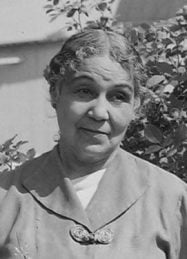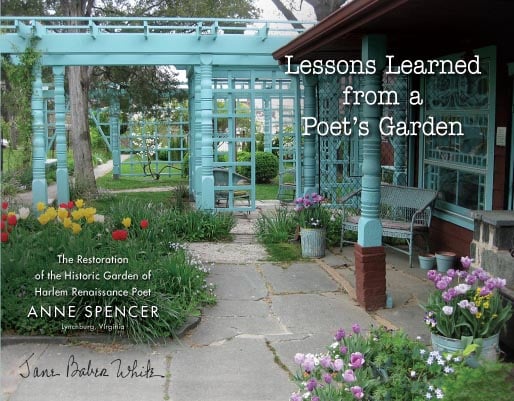10 Poems by Anne Spencer about Nature, Love, and Life
By Skyler Gomez | On November 24, 2019 | Updated May 27, 2024 | Comments (10)

Anne Spencer, born Annie Bethel Bannister (February 6, 1882 – July 27, 1975), was a poet, teacher, librarian, gardener, and civil rights activist. In this sampling of poems by Anne Spencer, we experience her affinity for nature, love, and life itself.
Anne Spencer was a prominent figure in the Harlem Renaissance. Her literary career began as she was a student in Virginia Seminary with her first poem, “The Skeptic.” After creating this poem, she continued to write on any surface she could find to record her thoughts, including the walls of her home and random scraps of paper.
This talented poet and gardener was an outspoken advocate for women’s rights, civil rights, and granting the right of respect to everyone.
An in-depth history and overview of Anne Spencer’s poetry from The University of Minnesota begins:
“Spencer’s love for the amalgamation of garden and poetic-themed-metaphors sprung forth and became what she is known for. Although it has been over a hundred years since Anne Spencer put her first thoughts onto paper, one may delight in the timelessness her lines evoke.
Her poem ‘God never planted a garden”’ is a good example of metaphoric inter-change of her garden and her poetic participation, as well as her ageless energy through words.”
Poems are reprinted by permission of the Anne Spencer House & Garden, © Anne Spencer Memorial Foundation. Anne Spencer’s poetry, photographs, films, intellectual property, and all other properties are protected and copyrighted under the full extent of the law.
Permission to use Anne Spencer’s poetry, photographs, films, intellectual property and all other properties may only be granted by the proper representatives that presently act on the behalf of the Anne Spencer House & Garden. Museum, Inc. Please inquire at annespencermuseum.com.
Poems included in this listing:
- For Jim, Easter Eve
- Lines to a Nasturtium (A Lover Muses)
- Earth, I thank you
- He Said
- 1975
- Life-Long, Poor Browning
- Requiem
- Taboo
- The Wife-Woman
- Translation
. . . . . . . . . .
For Jim, Easter Eve
If ever a garden was a Gethsemane,
with old tombs set high against
the crumpled olive tree—and lichen
this, my garden has been to me.
For such as I none other is so sweet;
Lacking old tombs, here stands my grief,
and certainly its ancient tree.
Peace is here and in every season
a quiet beauty.
The sky falling about me
evenly to the compass . . .
What is sorrow but tenderness now
in this earth-close frame of land and sky
falling constantly into horizons
of east and west, north and south;
what is pain but happiness here
amid these green and wordless patterns,
indefinite texture of blade and leaf;
Beauty of an old, old tree,
last comfort in Gethsemane.
. . . . . . . . . .

. . . . . . . . . .
Lines to a Nasturtium (A Lover Muses)
Flame-flower, Day-torch, Mauna Loa,
I saw a daring bee, today, pause, and soar,
Into your flaming heart;
Then did I hear crisp, crinkled laughter
As the furies after tore him apart?
A bird, next, small and humming,
Looked into your startled depths and fled . . .
Surely, some dread sight, and dafter
Than human eyes as mine can see,
Set the stricken air waves drumming
In his flight.
Day-torch, Flame-flower, cool-hot Beauty,
I cannot see, I cannot hear your flutey;
Voice lure your loving swain,
But I know one other to whom you are in beauty
Born in vain:
Hair like the setting sun,
Her eyes a rising star,
Motions gracious as reeds by Babylon, bar
All your competing;
Hands like, how like, brown lilies sweet,
Cloth of gold were fair enough to touch her feet.
Ah, how the sense reels at my repeating,
As once in her fire-lit heart I felt the furies
Beating, beating.
. . . . . . . . . .
Earth, I thank you
Earth, I thank you
for the pleasure of your language
You’ve had a hard time
bringing it to me
from the ground
to grunt thru the noun
To all the way
feeling seeing smelling touching
—awareness
I am here!
. . . . . . . . . .
He Said
“Your garden at dusk
Is the soul of love
Blurred in its beauty
And softly caressing;
I, gently daring
This sweetest confessing,
Say your garden at dusk
Is your soul. My Love.”
. . . . . . . . . .
1975
Turn an earth clod
Peel a shaley rock
In fondness molest a curly worm
Whose familiar is everywhere
Kneel
And the curly worm sentient now
Will light the word that tells the poet what a poem is.
. . . . . . . . . . .
Life-Long, Poor Browning
Life-long, poor Browning never knew Virginia,
Or he’d not grieved in Florence for April sallies
Back to English gardens after Euclid’s linear:
Clipt yews. Pomander Walks, and pleached alleys
Primroses, prim indeed, in quiet ordered hedges,
Waterways, soberly, sedately enchanneled,
No thin riotous blade even among the sedges,
All the wild country-side tamely impaneled . . .
Dead, now, dear Browning lives on in heaven, —
(Heaven’s Virginia when the year’s at its Spring)
He’s haunting the byways of wine-aired leaven
And throating the notes of the wildings on wing:
Here canopied reaches of dogwood and hazel,
Beech tree and redbud fine-laced in vines,
Fleet clapping rills by lush fern and basil,
Drain blue hills to lowlands scented with pines . . .
Think you he meets in this tender green sweetness
Shade that was Elizabeth . . . immortal completeness!
. . . . . . . . . .
Requiem
Oh, I who so wanted to own some earth,
Am consumed by the earth instead:
Blood into river
Bone into land
The grave restores what finds its bed.
Oh, I who did drink of Spring’s fragrant clay,
Give back its wine for other men:
Breath into air
Heart into grass
My heart bereft — I might rest then.
. . . . . . . . . .
Taboo
Being a Negro Woman is the world’s most exciting
game of “Taboo”: By hell there is nothing you can
do that you want to do and by heaven you are
going to do it anyhow —
We do not climb into the jim crow galleries
of scenario houses we stay away and read
I read garden and seed catalogs, Browning,
Housman, Whitman, Saturday Evening Post
detective tales, Atlantic Monthly, American
Mercury, Crisis, Opportunity, Vanity Fair,
Hibberts Journal, oh, anything.
I can cook delicious things to eat. . .
we have a lovely home—one that
money did not buy—it was born and evolved
slowly out of our passionate, poverty-
stricken agony to own our own home.
Happiness.
. . . . . . . . . .
The Wife-Woman
Maker-of-Sevens in the scheme of things
From earth to star;
Thy cycle holds whatever is fate, and
Over the border the bar.
Though rank and fierce the mariner
Sailing the seven seas,
He prays as he holds his glass to his eyes,
Coaxing the Pleiades.
I cannot love them; and I feel your glad,
Chiding from the grave,
That my all was only worth at all, what
Joy to you it gave,
These seven links the Law compelled
For the human chain —
I cannot love them and you, oh,
Seven-fold months in Flanders slain!
A jungle there, a cave here, bred six
And a million years
Sure and strong, mate for mate, such
Love as culture fears;
I gave you clear the oil and wine;
You saved me your hob and hearth—
See how even life may be ere the
Sickle comes and leaves a swath.
But I can wait the seven of moons,
Or years I spare,
Hoarding the heart’s plenty, nor spend
A drop, nor share —
So long but outlives a smile and
A silken gown;
Then gaily I reach up from my shroud,
And you, glory-clad, reach down.
. . . . . . . . . .
Translation

Learn more about Anne Spencer
. . . . . . . . . .
References
Greene, J. Lee. Time’s Unfading Garden. Baton Rouge: University of Louisiana, 1977.
Honey, Maureen. Shadowed Dreams: Women’s Poetry of the Harlem Renaissance. New Brunswick: Rutgers University, 1999.
Skyler Isabella Gomez is a 2019 SUNY New Paltz graduate with a degree in Public Relations and a minor in Black Studies. Her passions include connecting more with her Latin roots by researching and writing about legendary Latina authors.
I just discovered Ms. Spencer today in “Vogue” magazine. I am devouring EVERYTHING I can about this wise and talented woman. She is one example of why history, all history has to be learned, respected, remembered, and honored.
I must correct; found in “Veranda” magazine.
I agree, Margaret. Anne Spencer is a treasure, and not as well known as she should be!
Each time I come to your website and see the works of Anne Spencer, I feel proud and blessed to know that women and Black women in particular have added to the richness of the American landscape.
I am grateful to find my great Aunt Anne Spencer’s work on the web. I am in my mid to late 50’s reading and understanding who this amazing woman was. Thank You!
Jill, I apologize for this late response. I really appreciated your comment, and how wonderful that Anne Spencer was your great aunt … I wonder if you ever had the opportunity to meet her?
What a treasure! Being born in Lynchburg I was intrigued by the historical designation attached to Anne Spencer. I became more interested upon finding she was born in Henry Co where I lived for about 30 years and spent a lot of time in Patrick Co where her husband was born. Although I am white my parents taught me all people are created equal. I grieve for the hardship of those who had to suffer at the hands of others who thought they were superior no matter the reason!! Kudos to the Spencers for speaking up. They are an example for anyone on how to live life.
Thank you for your thoughtful comment, Patricia. Anne Spencer truly was a treasure, and left such a great legacy.
What a glorious find to meet these women poets! Thank you for sharing this beautiful blessing!
Thank you so much, Petra! They really are glorious and deserve to be discovered and read.